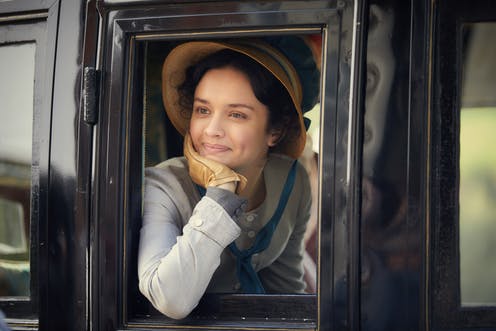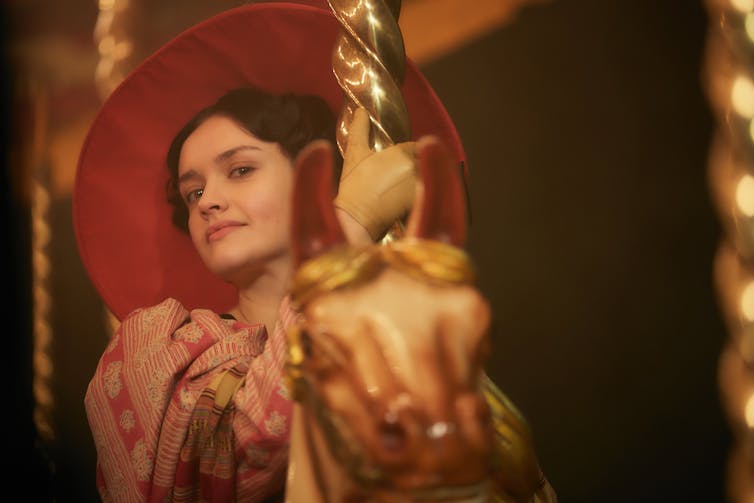The latest TV adaptation of Thackeray’s 1848 novel Vanity Fair has polarised audiences expecting a traditional period drama. The first two episodes of Vanity Fair, co-produced by ITV and Amazon, received a mixed response on Twitter where viewers commented using the hashtag #VanityFair.
It is ironic, too, given that Thackeray subverted and satirised the conventions and tropes of his own time. This was true across his writing. In Pendennis, for example, a novel about the titular young gentleman making his way in London, Thackeray writes in his preface:
Perhaps the lovers of “excitement” may care to know, that this book began with a very precise plan, which was entirely put aside. Ladies and gentlemen, you were to have been treated, and the writer’s and the publisher’s pocket benefited, by the recital of the most active horrors.
In Vanity Fair, such subversions are frequent. In the first episode of the new adaptation, Becky Sharp – attempting to charm the wealthy and credulous Jos Sedley into proposing marriage – attends the Vauxhall pleasure gardens. This takes place in chapter six of the book, which Thackeray introduces satirically:
We might have treated this subject in the genteel, or in the romantic, or in the facetious manner … Or if, on the contrary, we had taken a fancy for the terrible … we should easily have constructed a tale of thrilling interest, through the fiery chapters of which the reader should hurry, panting. But my readers must hope for no such romance, only a homely story, and must be content with a chapter about Vauxhall, which is so short that it scarce deserves to be called a chapter at all.
Within the full version of that quoted passage, Thackeray offers suggestions of how the story might have been written in these different “manners”. He plays with these kinds of conventions to set up readers’ expectations, only to subvert and parody them. One of the century’s other great novelists, Anthony Trollope, wrote that Vanity Fair raised the fundamental question of “what a novel should be.” Trollope takes issue with some of the same things as modern viewers:
There are absurdities in it which would not be admitted to anyone who had not a peculiar gift of making even his absurdities delightful. No schoolgirl who ever lived would have thrown back her gift-book, as Rebecca did the ‘dixonary’, out of the carriage window as she was taken away from school. But who does not love that scene with which the novel commences? How could such a girl as Amelia Osborne have got herself into such society as that in which we see her at Vauxhall? But we forgive it all because of the telling.
Same story, different flavours
Like Thackeray, Lewis Carroll, the Victorian author of Alice in Wonderland, was also highly attuned to the way stories become categorised via genre, satirising this in an 1855 short story entitled Photography Extraordinary. Carroll’s story, presented like a newspaper article, reports an invention which literally transcribes narrative fiction directly from the human brain. Not only can Carroll’s machine “develop” a story onto paper directly from the brain, but the story can then be redeveloped into different genres. Story writing, Carroll seems to suggest, was a question of mechanically adjusting language to fit the conventions of distinct genres and meet readers’ expectations.
Becky Sharpe at Vauxhall Pleasure Gardens. Mammoth Screen for ITV
As 21st-century readers and viewers, we still consume media in this way. Our genres have changed – we are not likely to talk about “silver fork” novels, for instance – but our use of genres has not. If anything, we have only become more reliant on them as we create more and more sophisticated algorithms for organising our digital media.
We also risk letting our expectations shape our understanding of the past. One of the big divergences between Thackeray’s book and the ongoing adaptation is that the series’ producers have elected to depict the Battle of Waterloo. When his military characters depart for the battlefield, Thackeray lets them drift out of view, writing: “We do not claim to rank among the military novelists. Our place is with the non-combatants.”
Thackeray, in other words, is willing to disappoint and frustrate readers’ expectations – he does not feel the need to conform to expectations. It is – as the book’s subtitle warns us – a “novel without a hero” (and in its serial form, not even a novel, simply “pen and pencil sketches of English society). But, of course, to adapt for television is to adjust the story to meet a different set of expectations. In that sense, adapting Vanity Fair is a bit like churning it through Carroll’s fiction machine one more time.



 BTC Flat at $89,300 Despite $1.02B ETF Exodus — Buy the Dip Toward $107K?
BTC Flat at $89,300 Despite $1.02B ETF Exodus — Buy the Dip Toward $107K?  Every generation thinks they had it the toughest, but for Gen Z, they’re probably right
Every generation thinks they had it the toughest, but for Gen Z, they’re probably right  Office design isn’t keeping up with post-COVID work styles - here’s what workers really want
Office design isn’t keeping up with post-COVID work styles - here’s what workers really want  Disaster or digital spectacle? The dangers of using floods to create social media content
Disaster or digital spectacle? The dangers of using floods to create social media content  Canada’s local food system faces major roadblocks without urgent policy changes
Canada’s local food system faces major roadblocks without urgent policy changes  The American mass exodus to Canada amid Trump 2.0 has yet to materialize
The American mass exodus to Canada amid Trump 2.0 has yet to materialize  JPMorgan Lifts Gold Price Forecast to $6,300 by End-2026 on Strong Central Bank and Investor Demand
JPMorgan Lifts Gold Price Forecast to $6,300 by End-2026 on Strong Central Bank and Investor Demand  Debate over H-1B visas shines spotlight on US tech worker shortages
Debate over H-1B visas shines spotlight on US tech worker shortages  Youth are charting new freshwater futures by learning from the water on the water
Youth are charting new freshwater futures by learning from the water on the water  6 simple questions to tell if a ‘finfluencer’ is more flash than cash
6 simple questions to tell if a ‘finfluencer’ is more flash than cash 

































